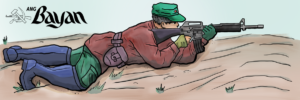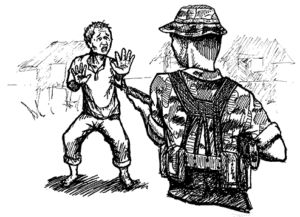Return of open-pit mining and TGCP strongly opposed

The people of South Cotabato strongly oppose the local government’s move to amend the Environment Code prohibiting open-pit mining in the province. In February, local officials held two rounds of consultations to supposedly listen to the opinion of residents. This is despite the fact that the basis for banning open-pit mining in the province remains. More than 3,000 residents showed up to protest against open-pit mining. Among them are the Archdiocese of Marbel, farmers’ organizations, leaders of settlers and the B’laan tribe who are most affected by the company’s operations.
The consultations were held upon the prodding of Sagittarius Mines Incorporated (SMI), in connivance with some officials and employing some tribal leaders, in order to pave the way for Tampakan Gold-Copper Project’s (TGCP) renewed operations. This is among the projects revived after the Duterte regime issued Executive Order No. 130 which allowed the reopening of open-pit mines on the pretext of revitalizing the economy. This type of operation was stopped by former Department of Environment and Natural Resources Sec. Gina Lopez.
In October 2021, more than 90,000 individuals signed a petition against amending the Environment Code. Earlier, a local court junked the case filed by SMI to nullify the local ruling.
The Environment Code was ratified in 2010 after the people of the province demanded a stop to the open-pit mine of erstwhile Xstrata-SMI. The code was instrumental for the people in blocking TGCP in the face of Executive Order 79 issued by the Benigno Aquino III regime which aimed to circumvent the ban on open-pit mining and grant SMI an Environmental Compliance Certificate in February 2013.
TGCP covers several thousand hectares of mines along the borders of South Cotabato, Davao del Sur, Sultan Kudarat and Sarangani. It purports to be the largest gold mine in Southeast Asia. It is also said to have the largest copper deposit in the whole world.
The continuing struggle
For three decades, the people of Far South Mindanao have been putting up armed and unarmed resistance against TGCP. Because of a strong and widespread democratic mass movement and the corresponding people’s resolute armed struggle and victorious punitive actions and offensives by the New People’s Army in the region, the giant multinational companies formerly operating the mines were driven away.
Ownership of the mine has changed through the years. In 2005, Western Mining Corporation of Australia sold the mine to Xstrata Plc., which in 2013 sold its shares to Glencore. In 2015, Glencore withdrew and left SMI as the sole operator.
During this time, consecutive victories in the legal arena also blocked the mine’s continuous operations. In 2004, the organization La Bugal won a court petition which challenged the legality of the Mining Act of 1995. This was reversed by the Supreme Court because the state supposedly needs the funds generated from foreign mining investments.
In March 2020, the Duterte regime extended for 12 more years the expired Financial and Technical Assistance Agreement. The National Commission on Indigenous Peoples followed suit by releasing a “Certification Precondition” based on the supposed concession of B’laan tribal leaders. But according to reports, the company openly bribed the tribal leaders for their consent. Those suspected of continued opposition are harassed and threatened by the military.
The military and the company’s paid agents responded with widespread violence in the form of extrajudicial killings, abductions and torture against those who oppose the mining operations. Some of the victims killed include activists Renato Pacaide, the Lagaro siblings, Boy Billanes, father and son Datu Anting and Viktor Freay, and Jovy Capion and her two small children. The military is also charged with several cases of forced dis-appearances.



